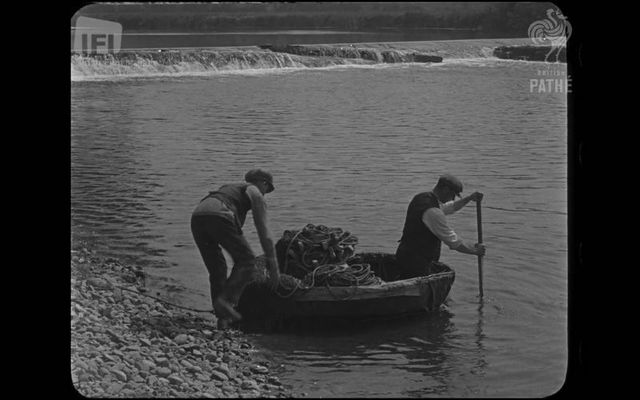"A Bygone Craft" is available to stream for free on the Irish Film Institute's IFI Archive Player. This 1931 newsreel depicts Irish men making a coracle, a hide-covered boat used for salmon fishing.
The boat-making process is demonstrated to camera, from creating a base with twigs, to weaving the structure and covering it in animal hide for waterproofing.
Men then push the coracle out onto the River Boyne and lay fishing nets. The intertitle tells how the Boyne is ‘the only place in Europe where such hide boats are still in use’.
This film is part of The Irish Independence Film Collection – The Early Irish Free State which explores facets of Irish society after the War of Independence and up to the birth of the Irish Republic.
The Irish Independence Film Collection – The Early Irish Free State at the Irish Film Institute
The Easter Rising, the War of Independence, and the Irish Civil War formed one of the most turbulent political periods in Ireland’s history. The impact of this struggle would define the social and political landscape of the emerging Irish Free State.
The Early Irish Free State Collection leads on from our previous historical release The Irish Independence Collection and explores aspects of the nation. Film production in Ireland was of low political and economic priority during this period and the newsreels, documentaries and cinémagazines in this collection were filmed by the non-indigenous agency, British Pathé. Although this representation of Ireland through a foreign lens offers us a very specific view of the fledgling nation, it also documents aspects of Irish life that may otherwise not have been recorded. We see parts of the country struggling with potato blight, traditional craft-making and the isolated way of life of the western islanders, in stark contrast to modern developments such as the development of hydro-power, manufacturing fairs, the promotion of brand Ireland and finally the beginning of the Irish Border, a concern which would return in this century.
These Irish newsreel stories were not held in an Irish archive until very recently and many had not been made available to the public since their distribution nearly 100 years ago. With the support of the Department of Culture, Heritage and the Gaeltacht, the Irish Film Institute was able to work with the original custodians of these collections (the British Film Institute and British Pathé) in order to repatriate, safeguard and share these vital visual records. By digitizing the fragile, original nitrate film prints to high-definition format, historians, academics and the public can now witness details not evident in the standard definition versions of the material, previously available.
The Early Irish Free State Collection enlists the expertise of Brenda Malone, of the National Museum of Ireland (NMI), to examine and add context to depicted events, people and locations, many of which were originally missed by non-Irish cataloguers. Additionally, Brenda links artifacts held at NMI, that carve out a broader, contextual historical map of politics, folklife, religion and tourism in the Irish Free State. Through this multiplicity of perspectives, we are able to see a nation forging its identity whilst grappling with the legacy of its tumultuous history.
"A Bygone Craft" is published here with thanks to the Irish Film Institute (IFI), who IrishCentral has partnered up with throughout 2022 to bring you a taste of what their remarkable collection entails. You can find all IrishCentral articles and videos from the IFI here.
To watch more historic Irish footage, visit the IFI Archive Player, the Irish Film Institute’s virtual viewing room that provides audiences around the globe free, instant access to Irish heritage preserved in the IFI Irish Film Archive. Irish Culture from the last century is reflected through documentaries, animation, adverts, amateur footage, feature films, and much more. You can also download the IFI Archive Player Apps for free on iPhone, Android, Apple TV, Amazon Fire TV, and Roku.
IrishCentral has partnered up with the IFI to bring you a taste of what their remarkable collections entail. You can find all IrishCentral articles and videos from the IFI here.

Love Irish history? Share your favorite stories with other history buffs in the IrishCentral History Facebook group.
* Originally published in 2022, updated in Oct 2024.




Comments